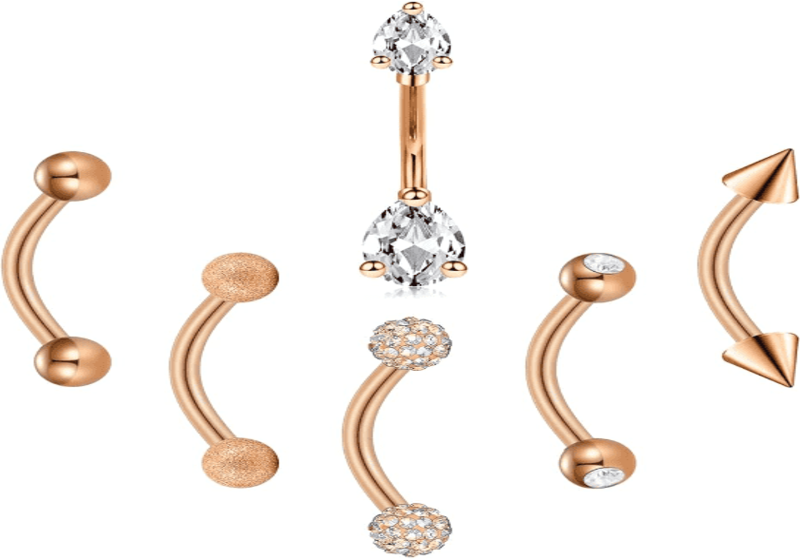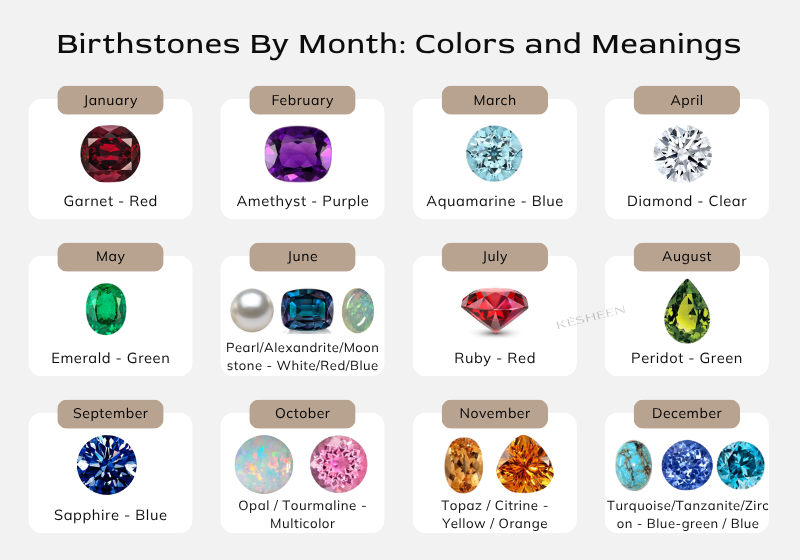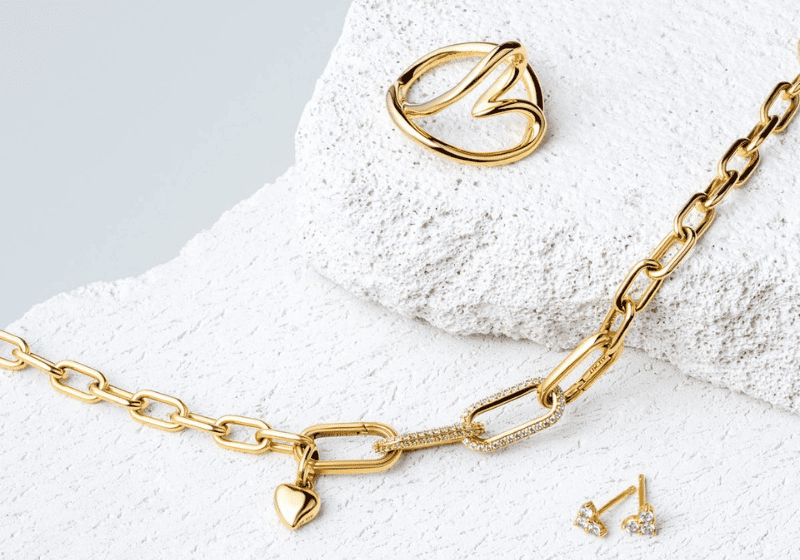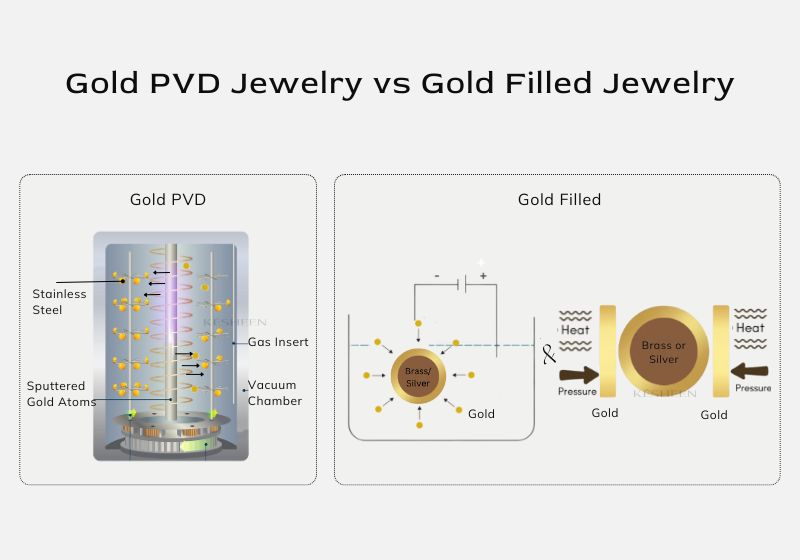Choosing the best metal for piercings is one of the most important decisions you can make—whether you’re opening a new piercing studio, running a jewelry brand, or simply getting a new piercing yourself. The right metal ensures safety, comfort, and a smooth healing process. The wrong metal leads to irritation, allergies, or prolonged healing. So, what is the best material for body piercings?
To be honest, we highly recommend surgical steel (316L stainless steel) for both brands and customers. Read on to find out why.
| Metal | Nickel-Free | Hypoallergenic | Safe for Initial Piercings | Safe for Sensitive Skin | Cost Level |
| 316L Surgical Steel | Low nickel, can be considered nickel-free | ⭐⭐⭐⭐⭐ | Yes – Best Choice | Excellent | $ |
| Titanium | Yes | ⭐⭐⭐⭐⭐ | Yes – Best Choice | Excellent | $$ |
| PVD Gold | Base metal contains low nickel | ⭐⭐⭐ | Yes | Yes | $$ |
| Niobium | Yes | ⭐⭐⭐⭐⭐ | Yes | Excellent | $$$ |
| Sterling Silver | No | ⭐⭐ | No | Moderate | $$$ |
| Gold | Depends on alloy | ⭐⭐⭐ | Only if nickel-free | Good for healed piercings | $$$$ |
| Platinum | Yes | ⭐⭐⭐⭐⭐ | Yes | Excellent | $$$$$ |
| Brass | No (if not proper plating) | ⭐ | No (if not proper plating) | Not recommended | $ |
What is Body Piercing Jewelry?
Body piercing jewelry refers to various types of jewelry pieces designed specifically to be worn by making a hole in the body. This includes the ear, nose, belly button, tongue, etc. These types of pieces are to be made from materials that are safe for use in and on the body.
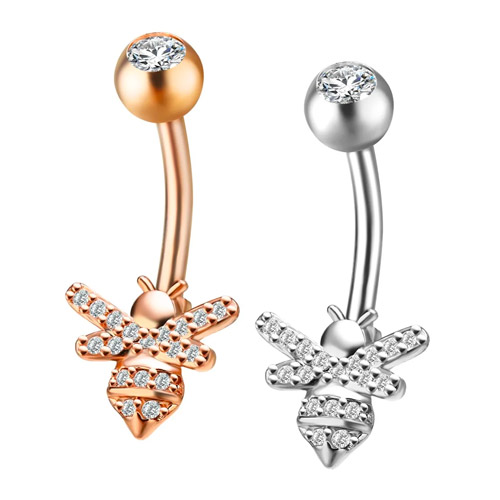
Why Body Piercing Material Matters
- Allergy and Irritation Risks
Choosing the wrong material can cause allergic reactions, infections, and irritations. For example, Nickel causes itching, redness, and swelling of the pierced part.
- Healing Process
The choice of material affects the healing process of the piercing. Some metals cause prolonged inflammation or delay of the healing process.
What Defines a Good Body Piercing Jewelry?
Choosing the right body piercing jewelry goes beyond appearance—quality materials directly impact comfort, healing, safety, and long-term wear. Here’s what truly defines good piercing jewelry:
- Durable & Lasting Color
The best body jewelry material is the one that lasts long, and doesn’t corrode, tarnish, or degrade over time. The Jewelry should not change color after consistent wearing or contact with water.
- Affordable & Value for Price:
Good body piercing jewelry for males and females should be budget-friendly. While being affordable, it should still prioritize safety and hypoallergenic properties, making it continually valuable.
- Friendly to Sensitive Skin
The best metal for piercing is one that’s suitable for people with sensitive skin. Choose materials that are known for their biocompatibility and non-allergic to every skin type.
- Lightweight & Right Size
Heavy or bad-sized jewelry can cause discomfort and strain on the piercing, resulting in swelling or tearing of the skin. An ideal body piercing jewelry should be lightweight and appropriately sized for the body part it’s inserted.
- Easy to Maintain
Just like every other piece of jewelry, body piercings should be easy to maintain for self-hygiene purposes and the prevention of infections. Choose metals that don’t react aggressively to day-to-day wear.
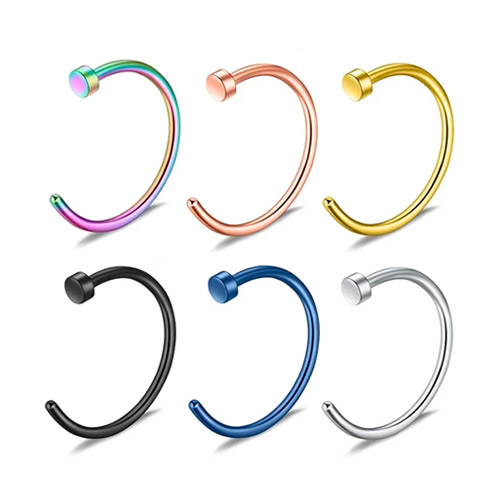
Elements that Might Cause Allergies in Body Piercings
There are quite a few elements that may cause allergies in body piercings, but Nickel is the most common. Normally, people with sensitive skin are allergic to nickel, and exposing the body to this element can result in several skin defects, such as redness, itching, blisters, etc.
Other elements that might cause allergies in body piercings for females and males are copper, lead, and cobalt.
Thus, before choosing your preferred jewelry, know the elements used in the manufacturing.
US Standards for Nickel Control
Proposition 65 is one of the standards and guidelines stipulated for the control of nickel content in jewelry making in the USA. For purposes of Proposition 65, Nickel is defined to be compounds of nickel with solubility in water of greater than 0.1 moles per liter (mol/L) at 20oC.
EU Standards for Nickel Control
Below are several new standards for nickel release, setting stricter benchmarks for nickel release:
- CEN EN 1811:2023
This standard outlines the reference test method for the release of nickel from post assemblies inserted into pierced parts of the human body and articles intended for direct and prolonged skin contact. It supersedes EN 1811:2011+A1:2015.
- CEN EN 12472:2020
This method simulates accelerated wear and corrosion for detecting nickel release from coated items, updating the previous standard EN 12472:2005+A1:2009.
- CEN EN 16128:2015
Focusing on ophthalmic optics, this standard is the reference method for testing spectacle frames and sunglasses for nickel release, replacing EN 16128:2011.
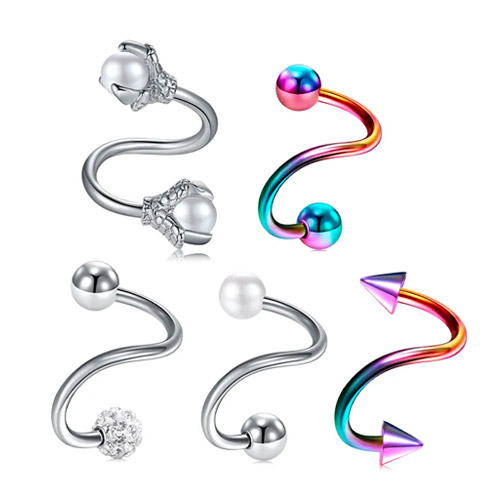
Best Piercing Materials For Initial Piercings
Choosing the best metal for piercings is crucial during the healing stage. Fresh piercings are more sensitive, so the safest options are hypoallergenic and proven to support healthy recovery.
So, what metals are safe for piercings? Below are the best piercing materials for sensitive skin and new piercings.
316L Surgical Steel
Surgical steel is one of the most common answers to “is surgical steel good for piercings?” This is a pure metal body piercing material that’s highly recommended even for the most delicate parts of the body. It is tarnish-resistant, hypoallergenic, and safe for sensitive skin, making it a trusted choice for new piercings.
Titanium
Titanium is widely considered the best piercing material for sensitive skin. It is nickel-free, lightweight, fully biocompatible, and ideal for all initial piercings. Look for implant-grade titanium (ASTM F-136 or F-67) when choosing titanium.
PVD Gold
PVD gold-coated stainless steel offers long-lasting color, excellent durability, and improved scratch resistance. When applied over high-quality 316L stainless steel, it becomes a stable and safe option for most people with sensitive skin.
Niobium
Niobium is naturally nickel-free, hypoallergenic, and highly stable—making it one of the safest answers to “what metals are safe for piercings?” It performs similarly to titanium and is suitable for fresh piercings, including those on very sensitive skin.
Best Piercing Materials for Healed Piercings
Once a piercing is fully healed, wearers can explore more decorative or premium metals. These materials remain safe but offer a greater variety in style, color, and finish.
Silver
Has a bright, lustrous appearance that’s highly valued for its beauty and combination with any type of outfit. Silver is most suitable for healed piercings and occasional wear. It’s not recommended for initial piercings and long-term wear because of tarnishing.
Gold
This is the best piercing jewelry for females due to its aesthetic appeal. Gold is available in various colors (yellow, white, or rose) and different karats (14K, 18K, 22K, or 24K). It can be used for any type of piercing, including initial and healed piercings. However, it should be solid gold, instead of gold-plated or gold-filled, to avoid fading and reactions.
Platinum
A dense, durable, and highly valuable material that’s extremely biocompatible and safe for sensitive skin. It’s popularly used for making high-end body jewelry because of its resistance to corrosion and wear.
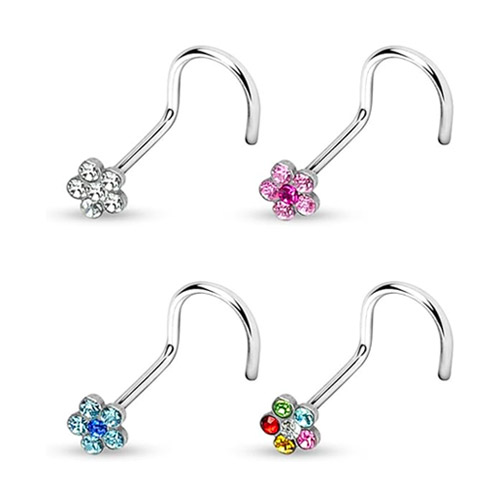
Benefits of Surgical Steel Body Piercings
Choosing surgical steel body piercings over other materials is greatly beneficial to brands & studios, as well as customers. These are some key advantages:
For Brands & Studios
- You Can Keep More Inventory
Surgical steel is generally more affordable than other materials, making it a cost-effective option. Thus, brands and studios can manufacture and keep a large inventory of surgical steel body piercing jewelry without a significant financial burden. A large variety of designs and sizes can be kept to meet diverse customers’ demands.
- Competitive Price Offer
Its cost advantage allows brands and studios to offer the best metal for piercing at competitive prices, making it easier to attract all customers, including those on a tight budget. This leads to higher sales and increased market penetration.
- Less Likely to Cause Allergies in Customers
Though surgical steel contains nickel, its nickel release is too low to cause allergic reactions compared to other materials. With this, brands and studios can reduce the risk of customer complaints and product returns, thus maintaining brand reputation and retaining customers’ trust.
For Consumers
Quality surgical steel body piercing jewelry does not cause irritation, damage, or allergies to your skin. This makes it a suitable choice for everyone, including people with sensitive skin. Also, its durability ensures jewelry maintains its appearance over time. What’s more, stainless steel is the best jewelry metal to wear in the shower, pool, and ocean.
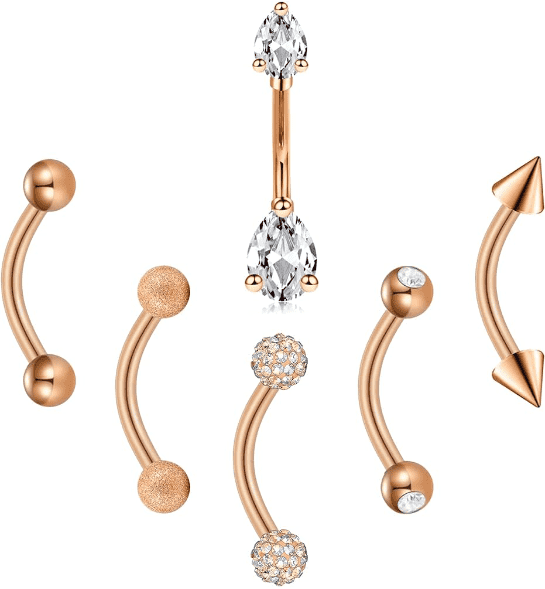
Is Stainless Steel or Surgical Steel Better for Piercings?
Both stainless steel and surgical steel are safe for body piercings, but 316L surgical stainless steel is generally better. It has higher corrosion resistance, lower nickel leaching, and greater biocompatibility than regular stainless steel (like 304). This makes it safer for initial and healed piercings, reducing the risk of irritation or allergic reactions while maintaining long-lasting durability and shine.
Is Stainless Steel or Titanium Better for Piercings?
Stainless steel (surgical steel) and titanium are the top 2 best choices for body piercings. Titanium is lighter, highly corrosion-resistant, and completely nickel-free, making it ideal for people with sensitive skin or metal allergies. 316L stainless steel is also hypoallergenic and durable, slightly heavier, and widely used for both initial and healed piercings. The choice depends on personal comfort, sensitivity, and budget.
Body Piercings Aftercare to Best Effect & Rapid Healing
To prevent infections, swelling, itching, or tearing of your skin, you need to imbibe some hygiene routine to boost the healing and take care of the pierced body part. Here are the 4 hygiene steps you need to adhere to:
Step 1: Daily Cleaning
- Wash your hand thoroughly before touching your piercing.
- Clean your piercing once a day.
- With clean hands, gently apply antimicrobial soap to the entry and exit holes of the piercing.
- Rinse the piercing with warm water to remove the soap residue.
Step 2: Saline Soaks
- Soak a clean cotton wool in a saline solution.
- Gently rub the soaked cotton on the piercing and leave it for a few minutes. This keeps the piercing clean, reduces inflammation, and boosts the healing process.
- Repeat this process 2-3 times daily.
Step 3: Protect the Piercing
- Stop touching the piercing to prevent bacteria.
- Keep the piercing dry always, especially after cleaning.
- Don’t swim for at least 30 days.
Step 4: Healthy Lifestyle
- Stop smoking and drinking alcohol. These activities slow down the healing process.
- Get enough rest and manage your stress levels to boost the healing process.
Key Takeaway
There are several types of body piercing material, but surgical steel is best recommended because of its affordability, aesthetic appeal, durability, and hypoallergenic properties. It suits the interests of manufacturers, suppliers, and consumers. All you have to do is contact a professional stainless steel jewelry manufacturer for your body piercing jewelry preferences.
